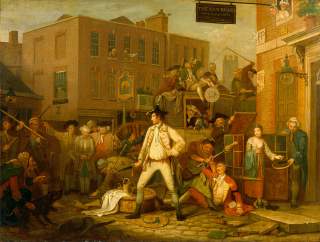History's Coolest Literary Club
In the Club: Johnson, Boswell, and the Friends Who Shaped an Age, Leo Damrosch surveys the world of Samuel Johnson, James Boswell, Edmund Burke, Edward Gibbon and other leading British eighteenth-century luminaries who shaped not only their age, but also our own.
As the Club gradually morphed into a trophy membership for the already rich and famous, often at the expense of talent and “clubability,” it is reassuring to know that its spirit occasionally manifested itself elsewhere. One such Victorian avatar was the Savage Club. Founded in 1857, it was named after Richard Savage, the purported bastard of a countess and an earl, and a colorful Grubb Street hack who perished in debtor’s prison in 1743. Johnson was enamored of Savage and made him the subject of one of his earliest works, The Life of Richard Savage, of whom he wrote that “having no profession,” he “became by necessity an author.”
Throughout the second half of the nineteenth century, the Savage Club was a haven for an amiable mélange of talented but out-of-pocket young scribblers and ancient, over-the-hill hacks, troubadours and bohemians. It has limped on into our own times, usually occupying a modest space set aside for it by a larger, more affluent club. When I happened on it in the 1970s, it occupied a small, rather dingy taproom in the otherwise palatial Lansdowne Club on Fitzmaurice Place in fashionable London W1.
I was there as the guest of an old friend, Brigadier Peter Young, who had been a World War II commando officer, commander of a regiment of the Arab Legion under Glubb Pasha, head of war studies (military history) at Sandhurst, and “Captain-General” of the Sealed Knot— a rollicking group of period re-enactors specializing in cavalier versus roundhead battles of the English Civil War. Peter was, of course, a cavalier. He was also a prolific author of books and articles on all matters military and very much a boulevardier. One drink led to another in the musty, dimly lit premises of the Savage Club, the little conversational circle began to grow and to glow, and a good time was had by all. In its own modest way, it was a Johnsonian moment, and a reminder that under the right conditions, as Johnson told Boswell on at least one occasion, “a tavern chair” can be “the throne of felicity.”
Aram Bakshian, Jr. served as an aide to Presidents Nixon, Ford and Reagan, and has written extensively on politics, history, gastronomy and the arts for American and overseas publications.
Image: Reuters

